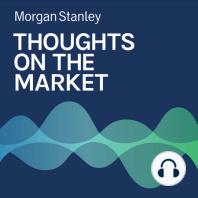3 min listen
Andrew Sheets: Stagflation Demystified
ratings:
Length:
4 minutes
Released:
Oct 8, 2021
Format:
Podcast episode
Description
Investor worries over growth and inflation have revived the term stagflation—but with growth indicators historically solid, is it an accurate description?----- Transcript -----Welcome to Thoughts on the Market. I'm Andrew Sheets, Chief Cross-Asset Strategist for Morgan Stanley. Along with my colleagues, bringing you a variety of perspectives, I'll be talking about trends across the global investment landscape and how we put those ideas together. It's Friday, October 8th at 2:00 p.m. in London. Near where I live in London, service stations are out of petrol - or to my fellow Americans, the gas stations are out of gas. In Europe, natural gas prices have roughly tripled in the last three months. Year-over-year, Consumer Price Inflation has risen 5.3% in the United States, 5.8% in Poland, 7.4% in Russia, and 9.7% in Brazil. It's not hard to see why one term seems to come up again and again in our conversations with investors: stagflation. Stagflation, broadly, is the idea that you get very weak growth, but also higher inflation together. Yet it's equally hard to miss in these conversations that while this term is widely cited, it's often ill defined. If stagflation means the 1970s, a time of wage price spirals and high unemployment, this clearly isn't it. Unemployment is falling around the world, and inflation markets imply pressures will moderate over time, rather than spiral higher. Market pricing is also very different. Over the last 100 years, the 1970s represented an all-time high in nominal interest rates and an all-time low in equity valuations. Today, it's the opposite. We're near a record low in yields and a record high in those valuations. Instead, what if we say that stagflation is a period where inflation expectations are rising, and growth is slowing? That's an easier, broader definition to apply, but even that hasn't really been happening. In the U.S., market expectations for inflation are roughly where they were in early June. U.S. economic data remains solid. The economic data is a little bit more mixed in Europe, but even here, growth indicators generally remain historically strong. So this clearly isn't a simple story, but we do think there are three takeaways for investors. First, recall that stagflation was also a very hot market topic in 2004/2005. Growth and markets had bounced back sharply in 2003, but by mid 2004, the rate of change on that growth had started to slow. And then energy prices rose. By spring 2005, the market started to worry that it could be the worst of both worlds. In April of that year, U.S. consumer price inflation hit 3.5% while measures of growth stalled. Stagflation graced the cover of the Economist magazine and the editorial pages in the New York Times. Equity valuations fell throughout 2004/2005 even as earnings rose, consistent with the current forecast that my colleague Michael Wilson and our U.S. Equity Strategy team. The second important point is that inflation is already showing up and impacting monetary policy. In just the last three weeks, central banks have increased interest rates by +25bp in New Zealand, +25bp in Russia, +50bp and Peru, +50bp in Poland, +75bp in the Czech Republic and +100bp in Brazil. That's a lot of activity. And all of this is keeping my colleagues busy and also creating opportunity in these markets. Third, while stagflation means different things to different people, past periods of rising inflation and slowing growth have often had one thing in common: higher energy prices. As such, we think some of the best cross-asset hedges for stagflation lie in the energy space. The market is very focused on stagflation; it just hasn't quite decided what that term really means. The 1970s are a long way away from our expectations or market pricing. Scenarios of slower growth and rising inflation clash with our economic forecasts of, well, the opposite. And recent moves in inflation expectations and other growth indicators don't fit this story as nicely as one would
Released:
Oct 8, 2021
Format:
Podcast episode
Titles in the series (100)
Andrew Sheets: For Markets, Signs, Signs, Everywhere Signs by Thoughts on the Market
